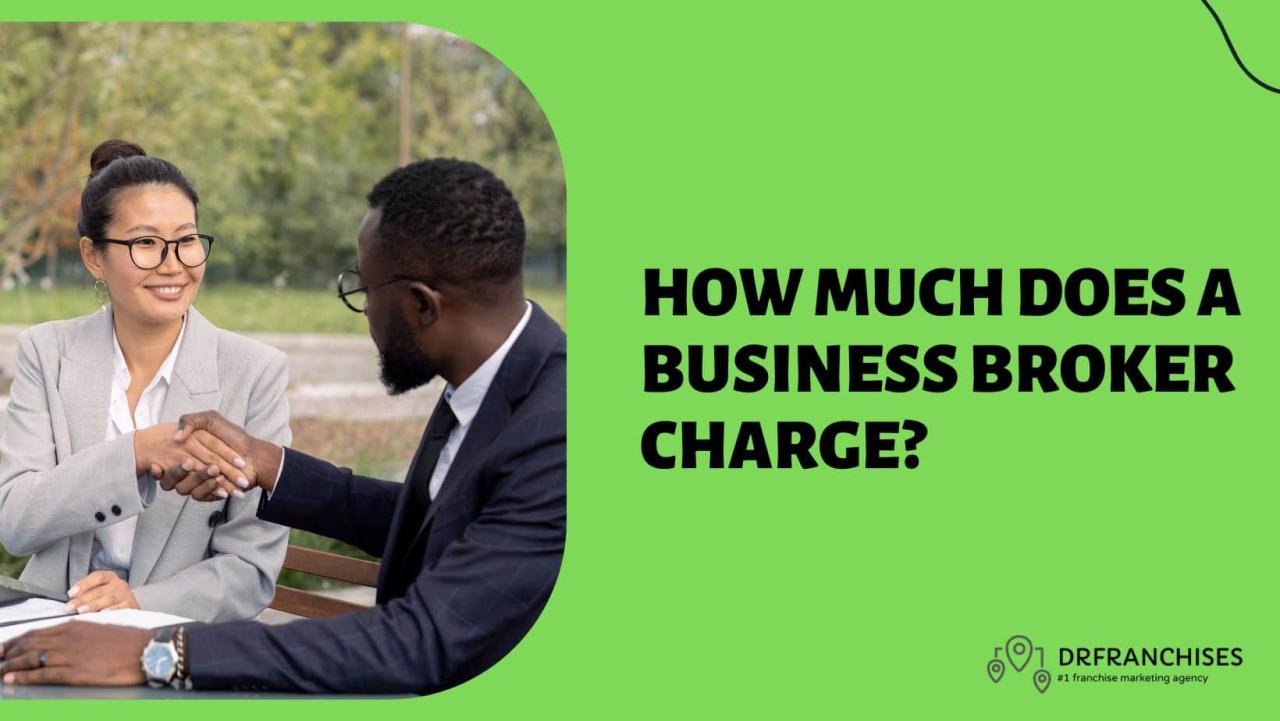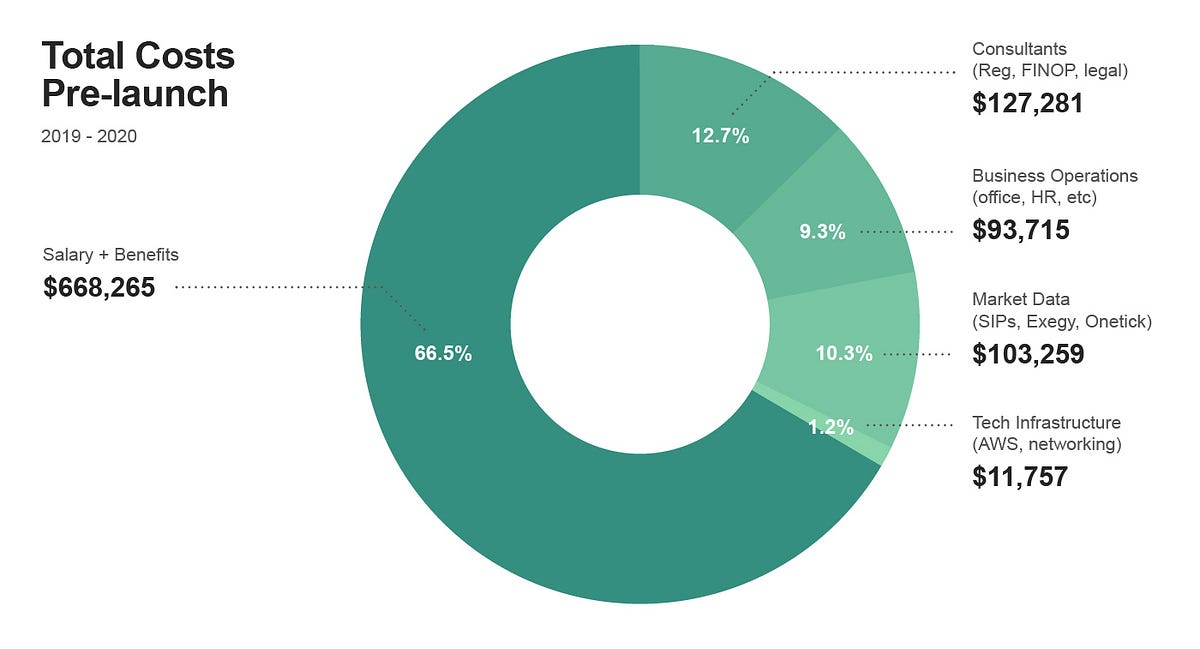How much does a business broker charge? This crucial question sits at the heart of any business sale, influencing decisions from the initial planning stages to the final closing. Understanding the various fee structures—percentage of sale price, flat fees, or hourly rates—is paramount. This guide unravels the complexities of business brokerage fees, exploring the factors that impact cost, services included, and strategies for effective negotiation. We’ll delve into real-world scenarios, providing clarity and empowering you to make informed choices during this significant financial transaction.
The cost of using a business broker isn’t a one-size-fits-all answer. Several key elements influence the final fee, including the size and type of business, its location, the complexity of the sale process, and prevailing market conditions. Understanding these variables is crucial for accurately estimating expenses and successfully navigating the sale of your business.
Fee Structures of Business Brokers

Business brokers employ various fee structures to compensate their services in facilitating business sales. Understanding these structures is crucial for both business owners considering selling and potential buyers navigating the acquisition process. The chosen structure significantly impacts the overall cost and the broker’s incentive to achieve a successful sale.
Business Broker Fee Structure Types
Business brokers typically utilize one of three primary fee structures: percentage of the sale price, flat fee, or hourly rate. Each offers distinct advantages and disadvantages, making the selection dependent on several factors.
| Fee Structure | Description | Advantages | Disadvantages |
|---|---|---|---|
| Percentage of Sale Price | The broker receives a percentage (typically ranging from 5% to 10%, but sometimes higher or lower depending on factors like complexity and sale price) of the final sale price of the business. This is the most common fee structure. | Directly aligns the broker’s interests with achieving the highest possible sale price for the seller; relatively simple to understand and calculate. | The broker’s fee can be substantial, especially for high-value businesses; may disincentivize the broker from pursuing lower offers if they still result in a significant commission. |
| Flat Fee | The broker charges a predetermined fixed fee regardless of the final sale price of the business. This fee is usually agreed upon upfront. | Provides price transparency and predictability for the seller; suitable for smaller businesses or those with a relatively straightforward sale process. | May not incentivize the broker to negotiate the highest possible sale price; can be less lucrative for the broker on higher-value sales. |
| Hourly Rate | The broker charges an hourly fee for their services. This structure is less common in business brokerage. | Provides transparency in terms of the broker’s time investment; can be beneficial for sellers who need specific services on an as-needed basis. | Can be difficult to predict the total cost upfront; may not align the broker’s interests with achieving a sale as quickly as possible. |
Factors Influencing Fee Structure Selection
Several factors influence a broker’s choice of fee structure. These include the size and complexity of the business being sold, the anticipated sale price, the broker’s experience and reputation, and the prevailing market conditions. For instance, a broker might prefer a percentage-based fee for a large, complex transaction to maximize their earnings, while a flat fee might be suitable for a smaller, simpler sale. The broker’s risk tolerance also plays a role; a flat fee represents a higher risk for the broker, while a percentage-based fee shares the risk with the seller.
Common Misconceptions About Business Broker Fees
A common misconception is that all business brokers charge the same fee. In reality, fees vary significantly depending on the factors Artikeld above. Another misconception is that the broker’s fee is the only cost associated with selling a business. Sellers should also budget for legal fees, accounting fees, and other expenses related to the transaction. Finally, some believe that a higher fee automatically translates to a better outcome. While a skilled broker justifies their fee through superior performance, the fee itself is not a direct indicator of success. The seller should focus on the broker’s experience, track record, and marketing strategy rather than solely on the fee.
Factors Affecting Broker Fees

The cost of engaging a business broker is not a fixed amount; it’s a variable influenced by several interconnected factors. Understanding these factors is crucial for business owners planning a sale, allowing them to budget effectively and negotiate fees transparently. These factors range from the inherent characteristics of the business itself to the broader economic climate.
Several key elements determine the final fee a business broker charges. These factors interact to create a unique pricing structure for each transaction. Ignoring these variables can lead to unrealistic expectations and potentially costly surprises during the sale process.
Business Size and Type
The size and type of business significantly influence brokerage fees. Larger businesses, with more complex operations and higher valuations, generally command higher fees. This is because the broker’s workload increases proportionally. For instance, the sale of a multi-million dollar manufacturing plant will require far more due diligence, marketing, and negotiation than the sale of a small, local bakery. Similarly, the intricacies of selling a technology startup with intellectual property considerations will differ greatly from selling a straightforward retail store. The complexity of the financial statements, legal structures, and operational details all factor into the broker’s time commitment and, consequently, the fee.
Transaction Complexity
The complexity of the sale process directly impacts the broker’s fee. A straightforward transaction with readily available financial information and a clear buyer pool will typically involve lower fees than a complex sale involving multiple stakeholders, intricate legal agreements, or significant restructuring. For example, a sale involving significant debt restructuring, complex asset valuations, or international implications would necessitate more extensive due diligence and negotiation, resulting in higher fees. The broker’s expertise in handling such intricacies is reflected in the pricing.
Industry and Market Conditions
The industry in which the business operates plays a role in determining the broker’s fee. Highly specialized industries may require brokers with specific expertise, potentially increasing their fees. Market conditions also exert a considerable influence. In a seller’s market, with high demand and limited supply, brokers may command higher fees due to increased demand for their services. Conversely, in a buyer’s market, fees might be slightly more negotiable due to increased competition among brokers. For instance, the sale of a highly sought-after franchise during a period of economic growth would likely attract a higher fee than the sale of a similar business in a struggling economic climate.
Location
Geographic location can also impact broker fees. Brokers operating in high-cost-of-living areas may charge higher fees to reflect their operating expenses and market rates. Furthermore, the local market dynamics and competition for similar businesses in a particular region can also affect pricing. A broker in a major metropolitan area might charge more than a broker in a rural area, even for businesses of similar size and type. The level of competition among brokers in a specific region will also play a role.
Broker Services and Their Costs: How Much Does A Business Broker Charge

Business brokers offer a wide array of services, and the scope of these services directly impacts the fees charged to clients. Understanding the different services and their associated costs is crucial for both buyers and sellers navigating the business acquisition process. The level of involvement a broker provides, from initial valuation to post-sale support, significantly influences the total cost.
The cost of a business broker’s services isn’t a fixed amount; it varies considerably depending on several factors, including the complexity of the transaction, the size and type of business, the location, and the broker’s experience and reputation. While some brokers charge a flat fee, the vast majority use a commission-based structure, usually a percentage of the final sale price. This percentage can range widely, often depending on the services included.
Business Sale Process and Associated Costs
A typical business sale involves several distinct stages, each with associated costs. Understanding these costs upfront is essential for effective financial planning. The following flowchart illustrates the typical steps:
[Imagine a flowchart here. The flowchart would visually represent the following steps and costs. The boxes would be connected by arrows indicating the flow of the process. Each box would contain a step in the business sale process and a brief description of associated costs. For example:
Box 1: Initial Consultation & Valuation (Cost: Hourly rate or flat fee)
Box 2: Marketing & Advertising (Cost: Percentage of sale price or fixed fee)
Box 3: Identifying & Screening Potential Buyers (Cost: Included in overall commission or separate fee)
Box 4: Negotiation & Due Diligence (Cost: Included in overall commission)
Box 5: Closing & Post-Sale Support (Cost: Included in overall commission or separate fee)]
Common Brokerage Services and Cost Implications
The services offered by business brokers significantly influence the overall cost. A comprehensive understanding of these services and their cost implications is crucial for informed decision-making.
- Business Valuation: This crucial initial step involves determining the fair market value of the business. Costs vary depending on the complexity of the valuation, but can range from a few hundred to several thousand dollars. Some brokers include this in their overall commission.
- Marketing and Advertising: Brokers actively market the business to potential buyers through various channels, including online listings, networking, and targeted advertising. The cost of marketing can be a significant component of the overall fee, either included in the commission or charged separately.
- Buyer Identification and Screening: Brokers identify and screen potential buyers, ensuring they meet the seller’s criteria. This service is typically included in the commission but may involve additional fees for extensive due diligence.
- Negotiation and Deal Structuring: Brokers expertly negotiate offers and help structure the deal to protect both the buyer and seller’s interests. This is a core service usually included in the commission.
- Due Diligence Support: Brokers assist with the due diligence process, facilitating the exchange of information and addressing buyer inquiries. This is typically included in the commission.
- Closing Assistance: Brokers guide both parties through the closing process, ensuring a smooth and efficient transaction. This is usually part of the commission.
- Post-Sale Support: Some brokers offer post-sale support, assisting with the transition of ownership and addressing any post-closing issues. This service may be included or charged separately.
Broker Involvement and Final Fee
The extent of the broker’s involvement directly correlates with the final fee. A broker offering a full-service package, handling all aspects of the sale from valuation to closing, will typically charge a higher commission than a broker providing limited services, such as simply listing the business. For example, a broker managing a complex sale of a large manufacturing business will command a higher percentage (e.g., 10% or more of the sale price) than a broker selling a small, straightforward retail business (e.g., 5-7%). The complexity of the transaction, requiring more time and expertise, justifies the higher fee. A simple transaction with a readily available buyer pool may result in a lower commission percentage.
Negotiating Broker Fees
Negotiating business broker fees requires a strategic approach, balancing your need for a skilled professional with the desire to secure the best possible financial terms. Effective negotiation involves understanding the broker’s fee structure, the value they bring to the transaction, and your own leverage within the deal. Thorough preparation and clear communication are key to achieving a mutually agreeable outcome.
Effective Strategies for Negotiating Business Broker Fees involve a multi-pronged approach. First, understand the market rate for similar services in your area. Second, leverage your understanding of the business’s value and marketability. A highly desirable business may allow for more negotiation on fees. Third, be prepared to justify any proposed reductions in the broker’s fee, perhaps by offering a performance-based component or a revised payment schedule. Finally, remember that a collaborative approach is often more effective than an adversarial one.
Clarifying Fee Structure and Services
Asking direct questions about the broker’s fee structure and the specific services included is crucial. For instance, you should obtain a detailed breakdown of all fees, including any commissions, advertising costs, and other expenses. It’s important to understand what services are included in the base fee and what constitutes additional charges. Inquiring about the broker’s experience with businesses similar to yours will help assess their expertise and justify their fees. Understanding the broker’s marketing strategy and anticipated timeline for the sale is also vital for informed decision-making.
Importance of a Written Fee Agreement
A comprehensive and clearly written fee agreement is paramount. This document should explicitly detail the broker’s fees, the scope of their services, payment terms, and any contingency clauses. The agreement should leave no room for ambiguity and should be reviewed by legal counsel before signing. A written agreement protects both parties and provides a framework for resolving any disputes that might arise during the sale process. Without a clear written agreement, misunderstandings and disputes over fees are much more likely. For example, a poorly defined agreement could lead to unexpected additional costs.
Comparing Quotes from Different Brokers, How much does a business broker charge
Comparing quotes from multiple business brokers is essential for making an informed decision. Direct comparison requires a standardized approach. Avoid focusing solely on the lowest fee, as the overall value proposition—including experience, marketing strategy, and network—should be considered. A detailed comparison matrix that lists each broker’s fees, services offered, experience, and client references will facilitate a more objective evaluation. This allows you to weigh the cost against the potential benefits offered by each broker, ensuring you choose the best fit for your specific needs and the value of your business.
Illustrative Examples of Broker Fees
Understanding the cost of using a business broker often involves examining real-world examples. The fee structure isn’t a fixed percentage; it varies significantly based on factors like the business’s size, complexity, and the broker’s specific services. The following scenarios illustrate this variability.
Business Broker Fee Scenarios
The following table presents three hypothetical business sale scenarios, highlighting the range of fees involved. These examples are for illustrative purposes and should not be considered definitive for all situations. Actual fees will depend on the specific circumstances of each transaction.
| Scenario | Business Type | Sale Price | Estimated Broker Fee |
|---|---|---|---|
| Scenario 1: Small Retail Business | Independent Bookstore | $150,000 | $7,500 – $15,000 (5% – 10%) |
| Scenario 2: Medium-Sized Manufacturing Company | Small-scale Manufacturing Plant | $2,000,000 | $40,000 – $80,000 (2% – 4%) |
| Scenario 3: Large Franchise Operation | Fast Food Franchise (multiple locations) | $5,000,000 | $100,000 – $200,000 (2% – 4%) |
Scenario Breakdown and Justification of Fees
Scenario 1: The lower end of the fee range for the small bookstore reflects the relatively straightforward nature of the sale. The broker’s services primarily involved marketing the business to a targeted buyer pool, managing negotiations, and handling the closing paperwork. A higher fee might reflect additional services, such as business valuation or assistance with financing.
Scenario 2: The manufacturing plant sale is more complex, requiring extensive due diligence and a broader buyer network. The broker’s services included comprehensive valuation, detailed financial analysis, extensive marketing to specialized buyers (potentially internationally), and negotiation of complex legal and financial agreements. This justifies the higher fee range.
Scenario 3: The franchise sale, involving multiple locations and potentially complex franchise agreements, necessitates specialized expertise. The broker’s involvement included extensive due diligence, valuation of multiple assets, negotiation of intricate legal and contractual terms, and marketing to a niche buyer base, including other franchisees and investors. The higher fee reflects the greater time commitment and expertise required.
Additional Costs Beyond Broker Fees
Beyond the broker’s fee, several other expenses can be involved in a business sale. These may include legal fees for reviewing contracts and ensuring legal compliance, accounting fees for financial due diligence and tax implications, and potential environmental or other specialized assessments depending on the nature of the business. These additional costs should be factored into the overall budget for the sale. For instance, in Scenario 3, significant legal fees related to franchise agreements could easily add tens of thousands of dollars to the overall cost.






